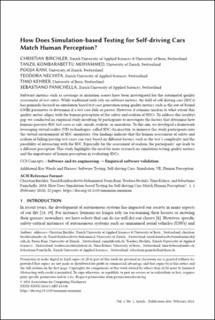Please use this identifier to cite or link to this item:
https://doi.org/10.21256/zhaw-30166| Publication type: | Conference paper |
| Type of review: | Peer review (publication) |
| Title: | How does simulation-based testing for self-driving cars match human perception? |
| Authors: | Birchler, Christian Kombarabettu Mohammed, Tanzil Rani, Pooja Nechita, Teodora Kehrer, Timo Panichella, Sebastiano |
| et. al: | No |
| DOI: | 10.21256/zhaw-30166 |
| Conference details: | ACM International Conference on the Foundations of Software Engineering (FSE), Porto de Galinhas, Brazil, 17-19 July 2024 |
| Issue Date: | 2024 |
| Publisher / Ed. Institution: | ZHAW Zürcher Hochschule für Angewandte Wissenschaften |
| Language: | English |
| Subjects: | Software testing; Self-driving car; Simulation; VR; Human perception |
| Subject (DDC): | 005: Computer programming, programs and data 006: Special computer methods |
| Abstract: | Software metrics such as coverage or mutation scores have been investigated for the automated quality assessment of test suites. While traditional tools rely on software metrics, the field of self-driving cars (SDCs) has primarily focused on simulation-based test case generation using quality metrics such as the out-of-bound (OOB) parameter to determine if a test case fails or passes.However, it remains unclear to what extent this quality metric aligns with the human perception of the safety and realism of SDCs. To address this (reality) gap, we conducted an empirical study involving 50 participants to investigate the factors that determine how humans perceive SDC test cases as safe, unsafe, realistic, or unrealistic. To this aim, we developed a framework leveraging virtual reality (VR) technologies, called SDC-Alabaster, to immerse the study participants into the virtual environment of SDC simulators. Our findings indicate that the human assessment of safety and realism of failing/passing test cases can vary based on different factors, such as the test’s complexity and the possibility of interacting with the SDC. Especially for the assessment of realism, the participants’ age leads to a different perception. This study highlights the need for more research on simulation testing quality metrics and the importance of human perception in evaluating SDCs. |
| Further description: | A preprint version of this paper is available at arXiv: https://doi.org/10.48550/arXiv.2401.14736 |
| URI: | https://digitalcollection.zhaw.ch/handle/11475/30166 |
| Related research data: | https://doi.org/10.5281/zenodo.10570960 |
| Fulltext version: | Accepted version |
| License (according to publishing contract): | CC BY 4.0: Attribution 4.0 International |
| Departement: | School of Engineering |
| Organisational Unit: | Institute of Computer Science (InIT) |
| Published as part of the ZHAW project: | COSMOS – DevOps for Complex Cyber-physical Systems of Systems |
| Appears in collections: | Publikationen School of Engineering |
Files in This Item:
| File | Description | Size | Format | |
|---|---|---|---|---|
| 2024_Birchler-etal_VR-Study-SDC.pdf | Accepted Version | 18.48 MB | Adobe PDF |  View/Open |
Show full item record
Birchler, C., Kombarabettu Mohammed, T., Rani, P., Nechita, T., Kehrer, T., & Panichella, S. (2024). How does simulation-based testing for self-driving cars match human perception? ACM International Conference on the Foundations of Software Engineering (FSE), Porto de Galinhas, Brazil, 17-19 July 2024. https://doi.org/10.21256/zhaw-30166
Birchler, C. et al. (2024) ‘How does simulation-based testing for self-driving cars match human perception?’, in ACM International Conference on the Foundations of Software Engineering (FSE), Porto de Galinhas, Brazil, 17-19 July 2024. ZHAW Zürcher Hochschule für Angewandte Wissenschaften. Available at: https://doi.org/10.21256/zhaw-30166.
C. Birchler, T. Kombarabettu Mohammed, P. Rani, T. Nechita, T. Kehrer, and S. Panichella, “How does simulation-based testing for self-driving cars match human perception?,” in ACM International Conference on the Foundations of Software Engineering (FSE), Porto de Galinhas, Brazil, 17-19 July 2024, 2024. doi: 10.21256/zhaw-30166.
BIRCHLER, Christian, Tanzil KOMBARABETTU MOHAMMED, Pooja RANI, Teodora NECHITA, Timo KEHRER und Sebastiano PANICHELLA, 2024. How does simulation-based testing for self-driving cars match human perception? In: ACM International Conference on the Foundations of Software Engineering (FSE), Porto de Galinhas, Brazil, 17-19 July 2024. Conference paper. ZHAW Zürcher Hochschule für Angewandte Wissenschaften. 2024
Birchler, Christian, Tanzil Kombarabettu Mohammed, Pooja Rani, Teodora Nechita, Timo Kehrer, and Sebastiano Panichella. 2024. “How Does Simulation-Based Testing for Self-Driving Cars Match Human Perception?” Conference paper. In ACM International Conference on the Foundations of Software Engineering (FSE), Porto de Galinhas, Brazil, 17-19 July 2024. ZHAW Zürcher Hochschule für Angewandte Wissenschaften. https://doi.org/10.21256/zhaw-30166.
Birchler, Christian, et al. “How Does Simulation-Based Testing for Self-Driving Cars Match Human Perception?” ACM International Conference on the Foundations of Software Engineering (FSE), Porto de Galinhas, Brazil, 17-19 July 2024, ZHAW Zürcher Hochschule für Angewandte Wissenschaften, 2024, https://doi.org/10.21256/zhaw-30166.
Items in DSpace are protected by copyright, with all rights reserved, unless otherwise indicated.